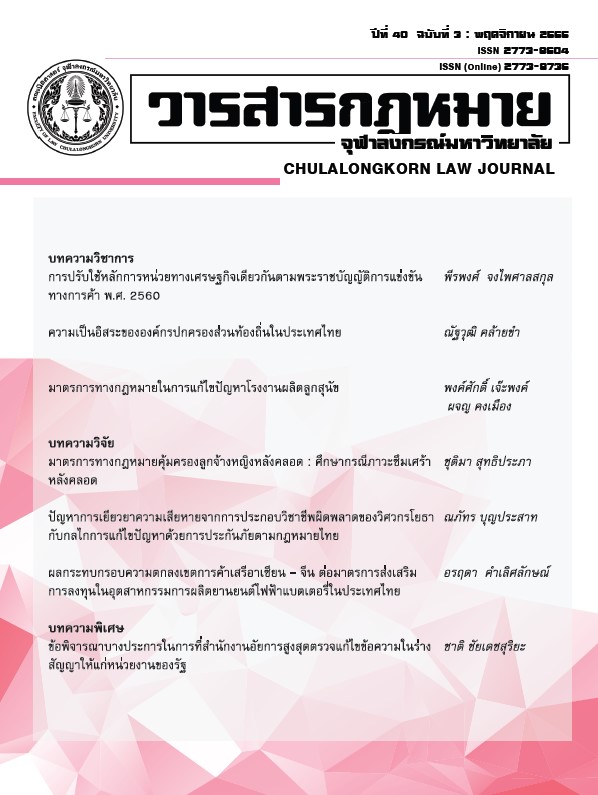ปัญหาการเยียวยาความเสียหายจากการประกอบวิชาชีพผิดพลาดของวิศวกรโยธากับกลไกการแก้ไขปัญหาด้วยการประกันภัยตามกฎหมายไทย
Main Article Content
บทคัดย่อ
งานของวิศวกรโยธาสัมพันธ์กับความมั่นคงแข็งแรงของสิ่งก่อสร้าง การประกอบวิชาชีพผิดพลาดของวิศวกรโยธาจึงส่งผลต่อการวิบัติของสิ่งก่อสร้าง ซึ่งนำมาสู่ความเสียหายต่อชีวิตร่างกาย อนามัย และทรัพย์สิน ตามกฎหมายไทยผู้เสียหายสามารถเรียกร้องให้มีการชดใช้เยียวยาความเสียหายทางแพ่งได้ตามหลักสัญญาและละเมิด หากแต่การเรียกร้องดังกล่าวยังคงมีข้อบกพร่องอยู่หลายประการ โดยเฉพาะปัญหาในด้านความสามารถทางเศรษฐกิจของวิศวกรในการชดใช้ค่าสินไหมทดแทน และปัญหาการสืบพิสูจน์ในกระบวนการพิจารณาซึ่งกระทำได้ยาก อีกทั้งการดำเนินการทางศาลก็มีระยะเวลานาน
การประกันภัยเป็นทางเลือกที่ดีในการแก้ปัญหาการเยียวยาความเสียหายทางแพ่ง เนื่องจากในทางปฏิบัติ กรณีไม่มีข้อโต้แย้งผู้เสียหายสามารถเรียกร้องให้ผู้รับประกันภัยชดเชยความเสียหายตามกรมธรรม์ประกันภัยได้ทันที โดยไม่จำเป็นต้องเข้าสู่กระบวนการทางศาล ทำให้ผู้เสียหายไม่ต้องมีภาระในการนำสืบพิสูจน์และได้รับค่าสินไหมทดแทนอย่างรวดเร็ว ประกอบกับบริษัทผู้รับประกันภัยมีฐานะทางเศรษฐกิจที่มั่นคง ผู้เสียหายจึงมั่นใจได้ว่าจะได้รับการชดใช้เยียวยาความเสียหายอย่างแน่นอน
ในปัจจุบันผู้ดำเนินโครงการก่อสร้างหรือเจ้าของอาคารต้องจัดทำประกันภัยความรับผิดในการก่อสร้างหรือสิ่งก่อสร้างภาคบังคับในหลายกรณี ขณะที่ผู้รับเหมาก่อสร้างหรือเจ้าของโครงการก่อสร้างก็มักจัดทำประกันภัยโดยความสมัครใจไว้ในรูปแบบของการประกันภัยแบบรวมความเสี่ยงภัย ซึ่งครอบคลุมความเสียหายจากการประกอบวิชาชีพผิดพลาดของวิศวกรโยธาไว้ด้วย อย่างไรก็ตามการประกันภัยในส่วนการประกันภัยภาคบังคับเป็นไปอย่างจำกัดมาก ขณะที่การประกันภัยโดยความสมัครใจก็ปรากฏข้อยกเว้นในการคุ้มครองความเสียหายจากการออกแบบผิดพลาด ทำให้เกิดช่องว่างในการคุ้มครองผู้เสียหาย ระบบการประกันภัยของไทยจึงยังมิอาจคุ้มครองผู้เสียหายได้อย่างสมบูรณ์และจำเป็นต้องมีการพัฒนาต่อไป
Article Details

อนุญาตภายใต้เงื่อนไข Creative Commons Attribution-NonCommercial-NoDerivatives 4.0 International License.
ลิขสิทธิ์และเนื้อหาในเว็บไซต์ของวารสารกฎหมาย (รวมถึง โดยไม่จำกัดเฉพาะ เนื้อหา รหัสคอมพิวเตอร์ งานศิลป์ ภาพถ่าย รูปภาพ ดนตรีกรรม โสตทัศนวัสดุ) เป็นกรรมสิทธิ์ของวารสารกฎหมาย และผู้ได้รับการโอนสิทธิทุกราย
1. วารสารกฎหมาย ให้อนุญาตให้คุณใช้สิทธิอันไม่เฉพาะเจาะจงที่สามารถถูกถอนเมื่อใดก็ได้ โดยไม่มีค่าใช้จ่าย ในการ
- เยี่ยมชมเว็บไซต์และเอกสารในเว็บไซต์นี้ จากคอมพิวเตอร์หรือเครื่องมือสื่อสารผ่านเว็บบราวเซอร์
- คัดลอกและจัดเก็บเว็บไซต์และเอกสารในเว็บไซต์นี้บนลงคอมพิวเตอร์ของคุณผ่านระบบความจำ cache
- สั่งพิมพ์เอกสารจากเว็บไซต์นี้สำหรับการใช้ส่วนตัวของคุณ
- ผลงานที่ได้รับการตีพิมพ์โดยวารสารกฎหมาย จุฬาลงกรณ์มหาวิทยาลัย ถูกคุ้มครองภายใต้ Creative Commons Attribution 4.0 International License ซึ่งอนุญาตให้ทุกคนสามารถคัดลอก แจกจ่าย ดัดแปลง ส่งต่อ ผลงานได้ ก็ต่อเมื่อผลงานและแหล่งข้อมูลได้รับการอ้างอิงอย่างเหมาะสม
2. วารสารกฎหมาย จุฬาลงกรณ์มหาวิทยาลัย สงวนสิทธิ์ไม่อนุญาตให้คุณใช้สิทธิอื่นใดที่เกี่ยวข้องกับเว็บไซต์และเอกสารบนเว็บไซต์นี้ เช่น การคัดลอก ดัดแปลง เปลี่ยนแปลง ส่งต่อ ตีพิมพ์ แจกจ่าย เผยแพร่ จัดแสดงในที่สาธารณะ ไม่ว่าจะในรูปแบบใดก็ตาม ซึ่งเว็บไซต์หรือเอกสารบนเว็บไซต์ โดยไม่อ้างอิงถึงแหล่งข้อมูลหรือโดยไม่ได้รับอนุญาตเป็นลายลักษณ์อักษรจากวารสารกฎหมาย จุฬาลงกรณ์มหาวิทยาลัย
3. คุณอาจขออนุญาตที่จะใช้เอกสารอันมีลิขสิทธิ์บนเว็บไซต์นี้โดยการเขียนอีเมลล์มายัง journal@law.chula.ac.th
4. วารสารกฎหมาย จุฬาลงกรณ์มหาวิทยาลัย เข้มงวดกับการคุ้มครองลิขสิทธิ์อย่างมาก หากวารสารกฎหมาย จุฬาลงกรณ์มหาวิทยาลัยพบว่าคุณได้ใช้เอกสารอันมีลิขสิทธิ์บนเว็บไซต์นี้โดยไม่ถูกต้องตามการอนุญาตให้ใช้สิทธิ ดังที่กล่าวไปข้างต้น วารสารกฎหมาย จุฬาลงกรณ์มหาวิทยาลัยอาจดำเนินคดีตามกฎหมายต่อคุณได้ เพื่อเรียกร้องค่าเสียหายที่เป็นตัวเงินและคำขอชั่วคราวให้คุณหยุดการใช้เอกสารดังกล่าว ทั้งนี้ คุณอาจถูกสั่งให้ชดใช้ค่าใช้จ่ายใดๆ ที่เกี่ยวข้องกับการดำเนินการตามกฎหมายนี้
หากคุณพบเห็นการใช้เอกสารอันมีลิขสิทธิ์ของวารสารกฎหมาย จุฬาลงกรณ์มหาวิทยาลัย ที่ขัดหรืออาจขัดต่อการอนุญาตให้ใช้สิทธิดังที่ได้กล่าวไปข้างต้น โดยเชื่อว่าได้ละเมิดลิขสิทธิ์ของคุณหรือของผู้อื่น สามารถร้องเรียนมาได้ที่ journal@law.chula.ac.th


